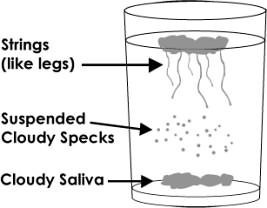Have you ever wondered if a yeast infection is contributing to your difficulties in becoming pregnant?
“Does it really matter that I get yeast infections, I only get them once in a while? “ and how about, “ What if I get yeast infections more than a couple times a year? I have other fertility issues and recurring yeast infections, do you think that the yeast infections are contributing to my difficulties in trying to get pregnant?“
These are all questions we get from women quite often. One of the questions on our Natural Fertility Consultation Intake form asks women if they have yeast infections and many of those women have checked yeast infections as a problem they have to deal with or have dealt with in the past.
What is a Vaginal Yeast Infection?
Candida albicans is a fungus, a form of yeast and is the most common form of Candidiasis also known as yeast infection. It is one of the main culprits for the cause of vaginal yeast infections, it is second to bacterial vaginosis. There are other species of Candida becoming increasingly prevalent as the cause of vaginal yeast infection, they are C. tropicalis and C. glabrata. Only testing could determine which species is causing the infection. Some doctors think this rise in other species of Candida causing vaginal yeast infection could be attributed to over the counter anti-fungal treatments. C. tropicalis and C. glabrata are more resistant to these over the counter anti-fungal medications. Antibiotic over-use, long-term oral contraceptive use, hormone therapy, having a suppressed or weak immune system and uncontrolled blood sugar are all contributing to the increase in yeast infections and anti-biotic resistant bacteria, according to Mayo Clinic staff.
There are over 20 species of Candida and they are part of our normal daily lives, it is when there becomes an overgrowth of the yeast that a problem arises. 70% of all women have Candida albicans as part of their normal vaginal flora. There has to be certain conditions present to provide an environment in which the yeast will grow out of control. Yeast thrives in a warm and moist environment. Other common yeast infections we are familiar with is in the skin folds (this often happens in overweight people) and thrush in the mouth, common in infants. A vaginal yeast infection may be hard to identify as the culprit for causing vaginal infection.
Medical testing for Candida is difficult since it is a common presence in the vagina and it is expensive. There is a home test for Candida that you can do for free. The key is that if you do not have symptoms such as itching, then there is no need to test for Candida.
How to Test for Candida at Home
This is an easy “candida spit test” that is simple to do at home, as suggested by CandidaSupport.org.
The Candida Saliva Test
1. Fill a glass of water and place it by your bed before you go to sleep.
2. When you wake up in the morning, first thing. work up some saliva and spit into the glass of water. You must do this before anything else enters your mouth or touches your lips. So you cannot kiss your partner, brush your teeth, drink water or eat anything before this test.
3. Take a look at your saliva in the glass immediately after you spit into the glass. Check again 3 minutes later, then every 15 minutes.

Healthy saliva will be clear and found floating on the top. Then it will slowly dissolve into the water without sinking or making the water cloudy. There may be some foam or bubbles present.
Candida saliva will have one or more of these three characteristics
- Cloudy specks suspended in the water
- Strings traveling down to the bottom of the glass
- Cloudy saliva that sinks to the bottom of the glass.
- The more strings, cloudiness, etc, the more candida is present
Yeast infection caused by Candida is rarely transferable via sexual intercourse, and if your partner has symptoms, then he can self-treat it with a topical anti-fungal cream. Men often do not have symptoms of Candida overgrowth until it is very severe, but regardless of symptoms, men can still have Candida.
Symptoms of Yeast Infection (Only one needed to qualify as an infection)
- Mild to severe vaginal itching mainly of the vulva
- Thick whitish discharge, cottage cheese appearance, yeast or bread-like odor (not always present)
- Swelling of the vulva, reddish irritation of the vulva, vulva may crack or fissure
- Burning sensation after or during sexual intercourse or urination
Note: These symptoms are rarely found in other vaginal infections such as bacterial vaginosis (BV) which has little itching. Runny clear discharge and a fishy odor are the major symptoms of BV. If after treatment for yeast infection, natural or over-the-counter, the symptoms persist, you may want to see your doctor to have testing done to rule out other causes of vaginal infection.
Risk factors for Yeast Infection
- Poor diet, high consumption of sugars
- Repeated use or recent use of antibiotic medication
- Any change in the environment of the vagina, ie sexual intercourse, menstruation, pregnancy
- Diabetes mellitus
- Use of birth control pills
- HIV, AIDS and other illness that causes a weakened immune system
- Oral Sex, if partner has thrush
- Tight synthetic underwear, such as polyester contribute to yeast overgrowth
- Public Hot Tubs
- Acute cases may arise from excessive consumption of alcohol or a stressful situation in life
If there is recurrent yeast infection (this is defined as 4 or more times a year) the woman may want to consider lifestyle changes in addition to topical and internal therapies. If you have recurrent vaginal infections please seek the advice of a health-care professional to rule out serious underlying conditions such as diabetes mellitus.
How Can Yeast Infections Affect My Fertility?
If you only get a yeast infection once or twice a year and it is easily treated by home methods, you are probably fine and the only way it will affect your fertility is by making you so uncomfortable from itching and slight burning you will not want to have sexual intercourse. It is best to avoid sexual contact while you have a yeast infection or any type of vaginal infection.
Recurrent vaginal yeast infections cause the internal vaginal flora to become unbalanced which may make it harder for the sperm to reach the uterus. Sperm is not killed by overgrowth of Candida, but because the infection changes the consistency of the cervical mucous, it may make it more difficult for the sperm to reach the cervical opening. Inflammation from the body trying to fight off the infection is hostile to sperm, too.
“Firstly you need to know that thrush is extremely common, generally harmless but unpleasant, and often very persistent (which is why there is a multiplicity of treatments available). However, I would say that I have never seen such bad thrush that infertility follows…” fertility Professor Robert Winston of the Genesis Research Trust.
If you have a vaginal yeast infection it is highly likely you got it from the colon and it is completely normal to be colonized by Candida. Because the digestive system is connected to areas of women’s bodies right near the opening of the vagina, the candida overgrowth may be spread through those areas of our bodies as well and vise versa through wiping after using the toilet. If we have yeast overgrowth in our intestines, this may affect proper absorption of the nutrients of the food we eat. We all know how important proper eating habits and regular consumption of whole foods are to our fertility, so Candida may affect our digestive system contributing to an imbalance of proper absorption and digestion of food.
An imbalance in our vaginal flora impairs the vaginal mucosa’s ability to fight off other infections or diseases, which may lead to other fertility issues later in life. Having a yeast infection is difficult on the bodies immune system and if you have other fertility issues you are trying to heal it may make it harder on your body if it is constantly fighting Candida overgrowth.
If you do not treat your yeast infection before your baby is born, you may deliver prematurely or you can pass the infection on to your baby. This actually happened to me and my second child. I had a bad case of bronchitis in the 3rd trimester of my pregnancy. My midwife and I decided that natural methods of healing were not working for this illness and I decided to take antibiotics (this is deemed safe only in the end of the 3rd trimester). Because antibiotics kill good bacteria (healthy gut flora) as well as bad, my vaginal flora was altered which altered the pH. This made me to a yeast infection which spread to my son at birth. He then got the yeast infection in his mouth (thrush) which spread to my nipples due to breastfeeding.
My bronchitis was still present two months after giving birth, so the doctor prescribed antibiotics again; my son then received the antibiotics through my breast milk and he got a yeast infection in all of his wonderful baby fat creases. The infection became so bad that his skin split open and would bleed. I hate to share this awful story with you, but I want all of you to understand how delicate our internal and external flora is. Changes in it puts you at risk for Candida overgrowth, which spreads easily. The yeast infection that my son and I had was aggressively treated by natural methods and we healed up, but it would have been best if we never had to endure that. Just to let you know, my bronchitis was not healed by the antibiotics and was later diagnosed as a mold allergy. This story paints a picture of the cascade of problems associated with repeated antibiotic use and the effects of killing our good intestinal and vaginal flora, as well as the healthy flora on our skin.
Ways You Can Treat Yeast Infection From Home
Dietary Changes
- Avoid eating refined grains such as white flour, white rice or any products containing these
- Avoid all sugars. Candida thrives on sugars, refined grains breakdown into sugars. This includes concentrated fruit juices, dried fruit, soda, candy, sweets, ice cream, etc. Even honey and agave should be avoided if possible. Consume only fresh vegetable juices made in a juicer.
- Eat a lot fresh vegetables, whole grains and fresh fruits
- Avoid alcoholic beverages. Alcoholic beverages contain high amounts of sugars.
- Take a good probiotic, mainly lactobacillus supplement to repopulate the “good” bacteria in your intestinal tract. We like MegaFlora by Megafood
- Eat organic plain yogurt with active live cultures of “good” bacteria.
- Be sure to take a wholefood multivitamin.
- Garlic capsules increase resistance to infection and supports immunity.
- Echinacea may help in acute infection to help support immunity short term.
These diet changes need to be implemented for at least 4-6 weeks to make a noticeable difference…
Topical Applications for Relief of Itching and Burning
Note: Do not use these except for Lavender/ Calendula bath if your vulva is cracked or fissured.
Use raw unfiltered organic apple cider vinegar diluted in water to wash your body and vaginal area. Apple cider vinegar helps protect and maintain a healthy ph level on your body. Soap contributes to more irritation and affects the ph level of your vagina and skin negatively contributing to yeast overgrowth.
Lavender/Calendula flower infusion (tea) sitz bath. Steep a pot of lavender and calendula flowers, about 1 cup in almost boiling water for 20 min. Add the infusion to your bath water.
In the shower rub organic plain yogurt all around your vaginal area, let this sit for 5 minutes. Repeat 2-3 times a day if possible.
Tea tree essential oil sitz bath. Tea tree oil is antiseptic, anitbacterial and antifungal. 10 drops in bath water. Warning-some people are sensitive to this oil and it may irritate the skin. Never put tea tree directly on to the vaginal area.
There are other applications that may be applied vaginally by suppository such as Yeast Arrest. This is a pre-made suppository that is easy to use and very effective. They help with both fighting the yeast infection and reducing the itching and discomfort.
Recurrent Candida albicans Infection
If you are still struggling to get your yeast infection under control you may want to consider a Candida Cleanse in addition to diet changes. Our favorite product for this is Candida
Balance. It contains herbs that help to support the body in fighting off a candida infection.
By supporting the healthy intestinal flora and maintaining healthy vaginal flora through diet, proper self care and sometimes supplemental and herbal support, you may be able to avoid getting vaginal yeast infections. Protecting the delicate balance of good bacteria in our bodies is important. If you are planning on becoming pregnant you will probably want to think ahead to how you can support your body in not getting a yeast infection, because you are more likely to get them during pregnancy.
- Romm, A. J. (2018). Botanical medicine for womens health. St. Louis, MO: Elsevier.
- Chevallier, A. (1996). The encyclopedia of medicinal plants. New York: DK Publishing.
- Yeast infection (vaginal) (n.d.). Mayo Clinic. Retrieved from https://www.mayoclinic.org/diseases-conditions/yeast-infection/symptoms-causes/syc-20378999
- White, J. and White, M. (n.d.). Simple Home Candida Test. Retrieved from https://www.candidasupport.org/resources/saliva-test/
- Winston, R. (n.d.) Persistent thrush and fertility. Retrieved from https://genesisresearchtrust.com/askrobert-questions-and-answers/persistent-thrush-and-fertility/






